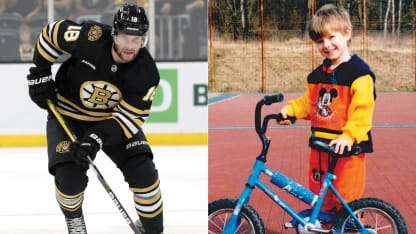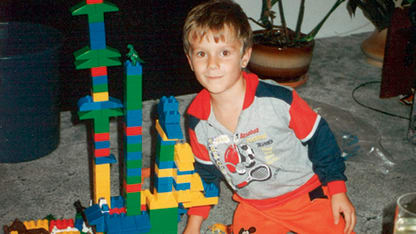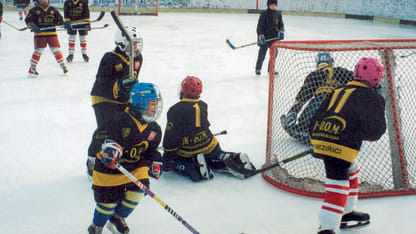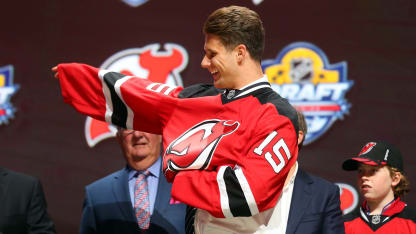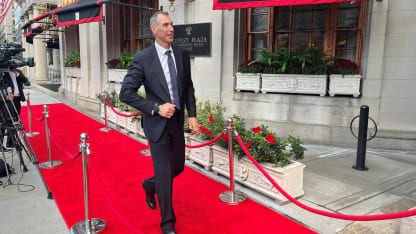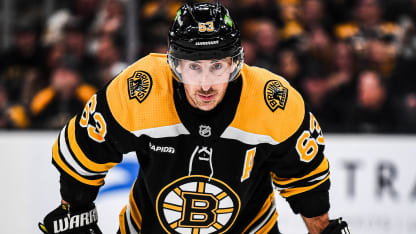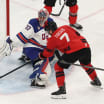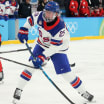BOSTON -- The man sat hunched over the books, poring through page after page.
He plucked texts from the shelves of the medical and pedagogical facilities at the university in Brno, Czech Republic, books about tennis stars Ivan Lendl and Martina Navratilova. Pavel Zacha was 38 years old, not yet the father of the future NHL player named after him, but his mind was already whirring, as he picked up Arnold Schwarzenegger’s book “Arnold’s Fitness for Kids, Ages Birth to Five.”
He ruminated on what the world would look like in 30 years, on how to marry health and happiness and success, knowing that he himself had always been happiest while playing sports. He thought about his other children, both girls, both athletic, and how he would raise this one differently, with purpose.
He studied the resumes of sports stars and artists and musicians, trying to search out commonalities from their childhoods, piecing together the ideal program, identifying tricks and tips and methods, constructing a future that would start at birth -- or, really, before.
His son, too, would play sports. He would make sure of that.
“I managed to convince my wife of this untraditional intention, which was absolutely crucial,” the father wrote to NHL.com last spring. “Before Pavel was born, I already had all the conditions prepared.”
The son, his destiny decided, was born on April 6, 1997.
They would name him Pavel.
* * * *
The younger Zacha grew up knowing no other life.
“Since a young age, he had told me that I have to be a professional in some sport,” the Boston Bruins center said of his father. “It was kind of like, ‘OK, you can choose which one you want to do, but you have to be the best at it.’”
Zacha gets a chance to prove that now, to move up in the ranks, to fulfill a father’s dreams, as he has in front of him the best opportunity of his professional career. With the retirements of the Bruins’ top two centers, Patrice Bergeron and David Krejci, during the offseason, a position in the top six is there for him to take.
Zacha will get every chance to prove he belongs beginning with the Bruins this season. He had three shots on goal in 16:42 of ice time on a 3-1 win against the Chicago Blackhawks on Wednesday. The Bruins next play Saturday at home against the Nashville Predators (7 p.m. ET; BSSO, NESN).
“The opportunity is huge here,” Zacha said. “I think that’s one of the reasons when I was traded here, it was like, learn as much as you can from the probably the top two two-way centermen in the League. I had the chance to play with them and then [this] opportunity showed up. I think that’s something that’s a little bit more pressure, but that’s what every player wants to do.
“I think I got a great opportunity last year, but this year to take it to the next step is huge.”
Getting here, though, started from the first moment young Pavel opened his eyes.
“I even thought it was possible to get kids used to moving and sport even earlier, almost since their birth,” the father wrote, noting that his daughters started the program at 8 and 10, which he later deemed far too late. “And I found out there were no boundaries to it. I’ve created my own structure of upbringing where sports would merge with music, languages, being outdoors, painting or building blocks from toy kits all the time so that it was varied and interesting for the kid and the kid could develop and get better all the time.”
Later, he would name it Kameveda.
Pavel and wife Ilona dedicated themselves to their son, who was a happy baby. The father built a small gym for him when he was 5 months old and delighted when he started walking at 9 months. Before his third birthday, he required a second bike because he had already destroyed his first.
On a typical day, father and son would finish breakfast and head outside to the sports playground to ride scooters and in-line skates, to play tennis and ballgames, to run and jump. There was soccer, 1-on-1, or the father would act as the goalie in hockey games.
They usually finished with archery before heading back inside for imaginative painting and singing, accompanied by a guitar.
The ice rink was next, for skating or skills.
After lunch, the next stop was a nature reserve, biking and wading through the river, climbing trees and rocks, cooking on a campfire.
There were Legos and English practice.
There was work with a hockey club or tennis club, some rest, some time with his grandfather. In the winter, he would finish the day with 70 minutes of skiing or snowboarding in the evening.
He was 3.
“Obviously I did not have a clue at the beginning about how far he would get in sports but I stopped worrying about his performance quite soon,” the father wrote, noting that his son was routinely competing against older kids -- and besting them.
When he was 4, the family added basketball and soccer to the tennis and hockey clubs he was a part of, added athletics and karate. By the time he was 12, they would whittle the sports back down to his two best, his two favorites, tennis and hockey.
“I watched which sport he likes the most and each one also gave him something to his total sports potential,” the father wrote. “It was tough but this is the healthiest approach for the kid because he is not overloaded one-sidedly but his development is compact, balanced and complex.”
“From [when he was 8 years old], we started to travel abroad, and everything started to get even more adventurous. People told me he would be fed up with sports but the truth was the opposite.
“In all those years, he never said he did not want to go to practice or to a game. And even nowadays, he never misses an optional practice in the NHL.”
The family had moved not long after Zacha was born from Brno to Velke Mezirici, where his father was from, for the fresh air and the healthy living. Then, at 12, Zacha and his father moved again, to Liberec, for Zacha to join the Bili Tygri Hockey Club, while Ilona remained home making money for the family with his sisters.
His dad was the only dad watching every practice, the only dad tossing his kid a protein shake after it was over, the only dad cooking meals so healthy they at times verged on inedible. (“We got in fights a couple times because I couldn’t eat it,” the younger Zacha said. “He got mad, so he tried it and he just threw it out because you couldn’t even put it in your mouth. He got better.”)
“When I planned all this, I considered this the highest sacrifice a father could give to his child,” the father wrote. “One has to completely ignore his own ego and put his child to the absolute top of all actions and family values.
“And when our son went to the [Canadian Hockey League] one day, the next day all this was suddenly over and I realized I had just passed the most interesting part of my life.”
